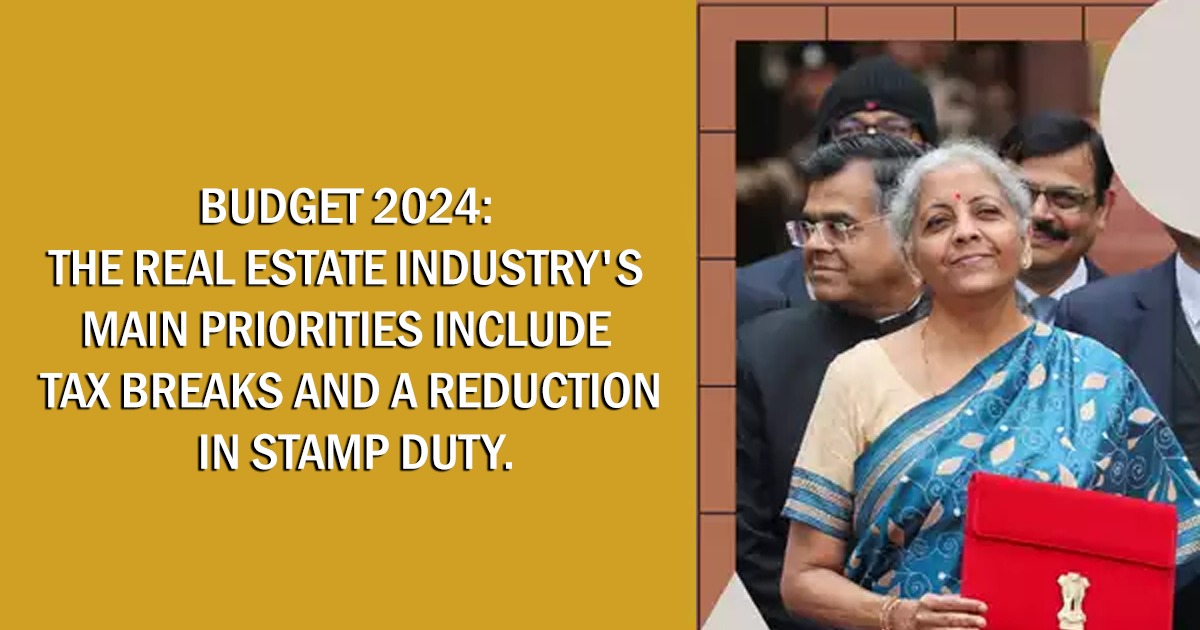Budget 2024: The real estate industry main priorities include tax breaks and a reduction in stamp duty
By Bricksnwall | 2024-02-01

Positive
market attitudes, economic growth, urbanization, changing lifestyles, higher
disposable incomes, improved job possibilities, more company activity, and
government policies have all contributed to the remarkable real estate
resurgence in the nation.
One industry
that has flourished in the Indian economy during the past year as it has
recovered from the crisis caused by COVID-19 is real estate. Positive market
sentiments, economic growth, urbanization, changing lifestyles, higher
disposable incomes, improved job possibilities, more corporate activity, and
government policies were some of the factors that propelled the sector's rise.
In addition,
the residential market continued to see robust demand as sales there surpassed
earlier records.
Having
stated that, here are some predictions made by the real estate industry for the
Union Budget of 2024:
1. Tax
breaks for homeowners: Ramani Sastri, Chairman and Managing Director of
Sterling Developers, suggested that the government increase the annual
deduction limit for interest payments on home loans from the current amount of
Rs 2 lakh to Rs 5 lakh, as this would stimulate the demand for homes. The
expert also demands changes to raw material prices and a decrease in the GST
rate on properties that are still under construction.
According to
Sastri, this year's expectations surpass the customary requirements of
industry status and single-window clearance, which may open up financial
benefits and speed up project approvals.
The business
also wants the long-term capital gains tax (LTCG) on real estate sales to be
reduced. Mananki Parulekar, co-founder of Claravest Technologies, stated that
"looking into the possibility of lowering the long-term capital gains tax
could amplify interest among homebuyers and investors, thereby contributing to
the expansion of the real estate market in India."
2.
Rationalization of house loan interest rates: Parulekar anticipates further
rate reductions from the center. Real estate sales can be boosted, according to
Parulekar, by lowering house loan interest rates, offering more flexible loan
tenure alternatives, and modifying the credit provisioning requirements for
home buyers.
This
modification will therefore take into account the increasing cost of real
estate, guaranteeing affordability for people whose salaries might not keep up
with these rises.
3. Stamp
Duty Concession: The real estate sector anticipates a stamp duty reduction as
well, as it may serve as a catalyst for higher rates of apartment and home
registrations and heightened market activity.
4. To
broaden the meaning of affordable housing: Sastri of Sterling Developers
pointed out that a significant portion of the populace still finds
affordability to be the largest obstacle, so the term should be expanded.
Increased investment in residential real estate will also result from any tax
exemption on rental income.
5. Reduced GST for small-scale coworking customers: According to Pratyush Pandey, CEO of Upflex India, the coworking space market is expanding rapidly in the modern day. A policy change that lowers GST for small-scale coworking clients may encourage more entrepreneurs to enter this market.
Source: Hindustan Times



